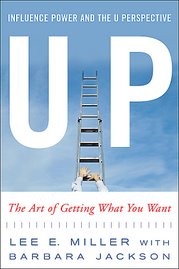It is relatively easy to get people to do what you want when you are their boss. Because of your position, your authority, your ability to reward them through salary increases, bonuses and promotions, the people who work for you will usually do what you ask them to do, although they may not do so enthusiastically. What if you are not the boss though? Say you need information from a peer in another department in order to complete an analysis that is due next week or you are seeking to get a client pay an outstanding bill that he is upset about? How do you influence people when you have no authority over them? That is where what we refer to as the “U Perspective” comes into play.The U Perspective allows you to use what other people care about to motivate them.
Most people simply assume that everyone sees the world the way they do. Even when we recognize that someone else may see a situation differently than we do, our first instinct usually is to try to persuade them to see things our way. The U Perspective takes the opposite approach. Its effectiveness is not rooted in the ability to convince others to change their views or adopt different values. Instead, its power comes from recognizing what others already believe and want. The U Perspective allows you to get what you want by working with another person’s belief system, not challenging it.
To influence someone without authority, you need to discover what is important to person you are trying to influence. You need to learn to see things through their eyes. Once you understand how they see a situation you have the ability to construct, and present, options in a way that more effectively influences what they do.Understanding someone’s U Perspective means being able to predict what they will do because they are who they are - given how they have behaved in the past and how they see the situation facing them. Of course, money can be used to get people to do things. Sometimes however you don’t have enough money or the exchange of money would not be appropriate. At other times money simply is not the best way to motivate someone.
People are motivated by many things other than money. Recognition, friendship, a shared purpose, status, time, ease, helping others, fairness, teamwork, family and challenge are all values that you can appeal to when you seek to gain someone’s help or support. Even a desire for fame can be a motivator for some people. What motivates each of us is different depending on the situation and the other people involved. Showing how what you want helps further what the people whose help you need care about, makes it easy to gain their support.
While intellectually we can accept that others may see things differently than we do, it is human nature to believe that our views are correct and that views that differ from our own are somehow less valid. This leads to ineffective, and often counterproductive, efforts to get people to change how they see a situation and what their natural inclinations. Generally, we assume that people who view a situation differently than we do simply do not have as much, or as accurate, information as we have. We believe, therefore, that if only we provide more information or explain our position more clearly, we can change their mind. More often than not they see the situation differently because they have had different life experiences and different training. No amount of additional information will negate how those experiences impact upon how someone evaluates a situation. Training also has a bearing on how we see the world. Engineers tend to look at things differently than do salespeople. Both tend to see things differently than accountants. Taking advantage of the U Perspective also requires getting past our assumption that we know what motivates others - i.e. the same things that motivate us.
Understanding someone’s U Perspective will instruct you as to what you need to do to gain their support. Perhaps you can appeal to friendship with someone with whom you have a good working relationship. Alternatively, the offer of future assistance may suffice with a person that you have helped in the past and who may need your help in the future. A suggestion that you will recognize, by way of an e-mail to their boss, the importance of their contribution to a project or the fear of a similar e-mail from your boss to theirs detailing a lack of support might be enough to carry the day. Influencing without authority starts with understanding all the possible ways you might invoke the things the person you are seeking to influence cares about.
When Lisa Caputo, now an executive at Citigroup, was Press Secretary for then First Lady Hillary Clinton, she appealed to the values of the journalists covering the White House to convince them to respect Chelsea Clinton’s privacy. In early 1993, Mike Myers did a skit on Saturday Night Live making fun of Chelsea who was only thirteen years old at the time. Lisa contacted NBC, but rather than trying to threaten or bully them, she appealed to their U Perspective as parents, “





